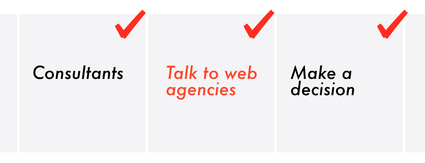How agencies can help your hunt for a ticketing system
On 22 March we were part of a panel presentation – with consultants Helen Dunnett and Sarah Gee – at the Ticketing Professionals Conference 2019.
This is a write-up of our part of the session:
If you’re in the process of seeking-out a new ticketing/CRM system, chances are you’ll need to do some significant work on your website to integrate with it.
Whether this prompts you to get a new website or integrate the new system into your existing site, it’s likely to be a significant project – so getting it right is crucial.
We’re often approached once organisations have already selected a new ticketing/CRM system; which can sometimes lead to unexpected limitations and/or costs in terms of website integration.
So, getting digital agencies involved at an earlier stage can help you avoid these surprises; and get the very best website functionality within your budget.

How important is your website?
It depends. For some organisations your website will be a very high priority, so you may be willing to compromise in other areas to get the best site. For others, the website will be important but not the number one priority. Either way, it’s worth keeping a few things in mind:
60% of tickets are sold online
The soon-to-be-released Spektrix Insights Report states that, on average, 60% of tickets are now sold online. And, depending on your business model, this could be even higher.
We also find that first time bookers are far more likely to book online. So it’s important for that first impression to be a good one.
More people will visit your website than your building (probably)
Consider all the time, effort and resources you put in to making your physical spaces look great, and function well for your audiences. You need to take the same approach to your website, after all, even more people are likely to use it.
Most people want to buy a ticket!
If you’re selling tickets, most people who visit your website will probably want to book some! So it’s important you get the best possible integration, and offer customers a great (i.e. quick and easy) booking experience.
The when, what, and how
When is it best to get in touch with agencies?
Once you’ve decided you need a new ticketing/CRM system – and perhaps have a shortlist of potential candidates – get in touch with agencies to discuss the implications of each system in terms of website integration.
Talking with a few different digital agencies before you decide which system to go with means you’ll have the most complete picture of what’s possible, and what the cost implications might be – from a web development perspective.

What do agencies need to know?
At this stage in your project we don’t need to know much, just three things:
- Core business goals
- Timeline
- Budget
With this information we can help you work out what kind of integration solutions are a good fit for your organisation.
(Digital agencies are usually a friendly, slightly geeky bunch, and are generally happy to
chat about web integration.)
How can agencies help?
When it comes to ticketing system integrations, digital agencies have expertise in three areas:
- Technology – integrations, APIs, the web
Agencies will have an understanding of the tools available and – certainly in the case of Supercool – often work with ticketing providers to push functionality and boundaries. So, we have useful insights into integrations: what’s possible, what isn’t – and what work-arounds may be possible to achieve highly-specific functionality that’s not currently built-in to a ticketing/CRM system. - Budget – initial and ongoing costs
By understanding your functionality requirements, and assessing how that might be achieved means we can give you a fairly accurate idea of cost implications for website integration – across different ticketing/CRM systems. - Future proofing
Like ticketing/CRM systems, digital agencies often have long-lasting relationships with their clients. We’ve built websites, implemented new integrations, installed updates; so we can help you estimate realistic ongoing maintenance costs.
How do different integrations impact what’s possible?
The cost of integrating your website with a ticketing/CRM system will vary, depending on the tools on offer from the system provider and what functionality you require.
Ticketing/CRM system suppliers will likely want to show you the most impressive web integrations to showcase what their system’s capable of – but it’s important to find out if those website integrations are realistic within your budget.
In general, a full API integration will cost more than using out-of-the-box solutions from ticketing system providers. That certainly doesn’t mean an API integration isn't right for your organisation, but it has to be worth your investment.
Keep ongoing maintenance in mind
A website is never finished. Whilst you’ll need to budget for the initial build, it’s crucial that you also take into account likely ongoing maintenance costs when budgeting.
Depending on the types of tools on offer from ticketing/CRM system suppliers, there could be significant costs for website integration; for example, when APIs are updated or new features released.
The support on offer to digital agencies from ticketing/CRM systems will also impact how efficiently we can build you the best website.
Ask potential ticketing/CRM system providers what resources they offer to web developers, and how they usually work with them.
In summary
Talking to consultants, like Helen Dunnett and Sarah Gee, and web agencies like us – as well as potential system providers – will help you to make the most informed decision about the best ticketing/CRM system for your organisation.
No matter the budget or complexity of functionality required, everyone’s shared goal will be for you to end up with a website and ticketing/CRM system that work brilliantly for you, and your audiences.